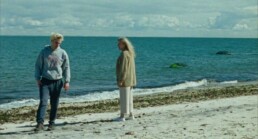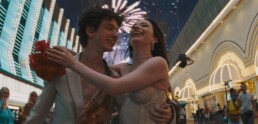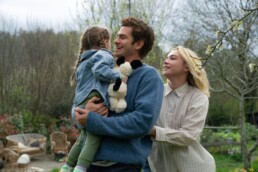'We’re Not Done Yet' Review: The Simple Pleasure of Reconnection
Director Joseph Longo acts alongside his mother in the redemptive short film We're Not Done Yet. Co-directed by Sofia Camargo, who shares Longo's vision for inspecting family dynamics, We're Not Done Yet is a simple yet effective look at the complex relationship between parent and child, specifically the nuance of mothers and sons. The film is 22 minutes long and will premiere at the 2024 Hamptons International Film Festival this week.
The Joy and Pain of Parenting
Alex (Joseph Longo) is visiting his mother Bettina (Barbara Sukowa) at her beach house for a weekend. They are not quite estranged, but in a typical parental fashion, Bettina is far from subtle in that she feels Alex should be visiting her more. The duo falls into a routine of morning yoga and beachfront strolls, a seemingly perfect way to reconnect and spend quality time together. However, their personalities clash when unresolved issues bubble up, forcing tension into an already tender relationship.
Bettina is an empty nester who wants to regain a sense of responsibility. She thinks adopting a child will fill the void in her life, despite her being 70 years old. She is also back on the dating scene and introduces Alex to her new boyfriend, Doug (Danny Mastrogiorgio). Alex is clearly not a fan of his mom's recent life choices and especially mocks her for wanting to adopt a child at her age. This frustration hits Alex's pain point: his lack of control, and his growing feeling of exclusion from his mother's life. From Bettina's perspective, it's never too late to live a little. Her son is an adult and out of the house, so why not date and feel wanted again? On the contrary, Alex expects Bettina to prioritize caretaking him first and foremost. He is her son after all!
Growing Up, Letting Go, and Moving On
Both express their needs in not the healthiest of ways, but ultimately, they cut the tension by returning to the ocean and taking a moment of introspection. It's here where they realize that they are both human with constantly evolving wants and needs, and their love for each other is unconditional.
A True Family Affair
We're Not Done Yet offers a humorous and touching look at this common mother-son dynamic. What sets it apart from other films that focus on similar themes is the casting of a real-life mother-son duo. Their chemistry is undeniably sharp and captures both the struggles and joys of growing up and moving on. I'm not privy to director Joseph Longo's personal family relationships, but it's fair to guess that working on this film only strengthened his bond with his mother. Another strong aesthetic choice is the color grade which gives the film the look and feel of a 1970s film.
Takeaway
A highly intimate and personal love letter about the art of reconnection, We're Not Done Yet is a powerful watch. It aims to spark conversation around family dynamics, specifically the fear of letting go and facing adulthood.
'Anora' Review: An Electrifying Odyssey Through Love, Loss, and New York City
If you want to see the best film of the year, look no further than Sean Baker's Anora. Winner of the Palme d'Or at the Cannes Film Festival, Anora follows the rise and fall of an erotic dancer named Ani. Baker's operatic love story is equally stunning and devastating as it depicts a whirlwind young romance destined to fail from the start. Not only is Anora a dazzling cinematic experience from script to screen, it also catapults lead actor Mikey Madison to stratospheric heights.
A Cinderella Story That Could Only Come From Sean Baker
Anora opens with a five-minute sequence set in a New York strip club, perfectly synched to a remix of Take That's single "Greatest Day" (looking back through my notes during the screening, I had underlined–multiple times–"hot song!"). As the song pulsates through the speakers, Russian American sex worker Ani (Mikey Madison), short for Anora, is in her element working the floor of the gentlemen's club with finesse and confidence. She may be scantily clad but what she lacks in modesty, she compensates for in charm and charisma. Ani flirts with the guests, her warm demeanor and inquisitive nature make her a natural conversationalist. It's not unusual for men to fall in love with her for the night before they inevitably return to their wives in the early morning.
On this night, Ani is set up with a young and mysterious client who specifically asks for a Russian-speaking dancer. Unbeknownst to her, this scrawny and boisterous nepo baby will change her life forever. She quite literally falls into the lap of luxury when she meets Ivan (Mark Eidelshtein), the son of a very wealthy Russian oligarch. A couple of years her junior, Ivan is immediately smitten with Ani, so much so that he convinces her to quit her job to spend time exclusively with him at his mansion in Sheepshead Bay. Hesitant at first, Ani eventually agrees. But she is a businesswoman first and foremost, so a deal is reached, prompting her to pack her bags, leave her Brooklyn apartment, and begin her new role as "girlfriend".
From Russia, With Love
On paper, these two opposites are initially only focused on each other's superficial qualities: sex and money. However, it's not long before Ani and Ivan develop genuine feelings. This growing attachment makes Ivan's upcoming situation complicated. He eventually confesses that his Visa is expiring and he must return to Russia. However, Ivan–who is used to getting whatever he wants–proposes a solution. He can stay in America if he marries an American. Ani reads between the lines. A spur-of-the-moment decision brings them to a little white chapel in Las Vegas, where they exchange drunken "I do's". Walking down the bustling streets of Sin City, with fireworks lighting up the sky, Ani is on cloud nine. She knows it's fast and completely unexpected, but she's never been happier.
A Beautiful Dark Twisted Fantasy
The honeymoon phase doesn't last long. Once word gets back to Ivan's parents that he married a sex worker, they immediately jump on a plane to force an annulment. While they travel to New York, Ivan's parents dispatch the family guardian Toros (Karren Karagulian) to talk some sense into Ivan. From here, Ani's love story turns into complete and utter chaos. Toros and his cronies, Garnick (Vache Tovmaysan) and Igor (Yura Borisov), force their way into Ivan and Ani's life. These men look tough, act tough, and will not take no for an answer. Afraid of his family's retaliation, Ivan flees his mansion and goes MIA, leaving Ani at Toros's mercy. From here, the film unravels into a wild goose chase as the unlikely group tries to track down Ivan and bring him home.
Shooting the Film in 35mm Using Anamorphic Lenses
Ani comes from the working-class world and is understandably swept away by Ivan's wealth. She romanticizes him and his deep pockets. Much like how Dorothy in The Wizard of Oz experiences color when she enters the land of Oz, Ani's world gets brighter just being next to Ivan. To further illustrate this new dimension and worldview, Sean Baker was adamant about shooting on 35mm with anamorphic lenses. This decision, lensed by director of photography Drew Daniels, gives Anora a timeless and beautifully sculpted aesthetic style.
Takeaway
Much like its titular character, Anora is a straight-shooting, no-BS, mesmerizing odyssey that, once experienced, is impossible to forget. It's as much an exaggerated story of a sex-filled love bombing as it is an intimate look at class and access. Backed by strong performances that will make you laugh out loud and possibly shed a tear, Sean Baker once again strikes gold by telling another human-centered story that rings true with authenticity, courage, and heart. I hope he is ready to accept a lot of gold this awards season too.
'Last Party' Review: Teenagers Face an Unexpected Leveling Up
Director Nicolas Dozol presents a unique coming-of-age story in his feature-length film, Last Party. Utilizing one location for the duration of the 70-minute drama, Last Party incorporates intricate on-screen choreography and camera sleight of hand to capture a transformative night. Comprised of 28 long takes that give the illusion of a single shot, Dozol's intention has a delightfully artful result. Last Party will have its World Premiere at the Chelsea Film Festival on October 20, 2024.
Teenagers Face an Unexpected Leveling Up
Last Party blends different cinematic genres, including mystery and drama, to tell the story of a life-changing night for four teenagers. While celebrating their recent high school graduation with classmates, they are all separately confronted with internal angst. They are suddenly faced with difficult truths and uncomfortable awakenings, which catches them off guard since they were expecting a fun-filled night of carelessness rather than a life lesson. At the film's climax, the four teens find themselves accidentally locked in a room wondering if this awful night might be their last. Ultimately, they realize that facing these unmet needs will help shape them as they embark on the next chapter of adulthood.
The Camera Conveys Emotion
Appealing to fans of Euphoria, Last Party also doesn't shy away from showing the more provocative nature of teenage liberation, including drinking, drugs, and random hookups. As the characters become more inebriated, the camera movements mimic their mental state. They too get more loose and fluid as if we the audience are experiencing their increasingly blurry state of mind. The production design succeeds in creating a party atmosphere, however, there are moments in the film that are awkwardly quiet, especially for a house party. The music, while pleasant to listen to, does a lot of the heavy lifting.
Takeaway
Last Party is not a typical coming-of-age story that has a conclusive ending. It seems director Nicolas Dozol would rather plant seeds of curiosity that give way to rumination than force-feed the audience a pre-packaged resolution. This leaves Last Party more open to interpretation. Five years in the making, with a shooting schedule of just five days, Last Party is an artful illustration of the sudden, and sometimes chaotic, transition from teenage to adulthood.
'We Live in Time' Review: An Emotional Rollercoaster for Hopeful Romantics
Falling in love comes with its fair share of risk. There are many unknowns to consider at the beginning of any relationship, including intention, longevity, and shared future goals. Statistically speaking, cultivating a successful long term relationship is a rare event! But when you meet your soul mate–your person– suddenly, the risk becomes worth taking. No challenge is too difficult when you're facing it together. In the heart-heavy drama, We Live in Time, a couple is forced to re-evaluate major life decisions after a cancer diagnosis puts an expiration date on their future.
A Love Story Takes a Devastating Turn
Directed by John Crowley (Brooklyn), We Live in Time stars Florence Pugh and Andrew Garfield as partners who attempt to make the most of their time together after receiving devastating news. Told in a non-linear structure, the film begins with Almut (Pugh) learning that her ovarian cancer has returned. This time, it has metastasized to Stage 3. Having already fought and beat cancer once, the thought of doing it all over again is exhausting. She proposes an unorthodox idea to Tobias (Garfield): what if she skips chemo and together, they make the most out of 6 really good months rather than 9 months of chemo-ridden horrible ones?
From here, the film jumps backward in time to tell each character's backstory. Almut is a professional chef and Tobias is a recent divorcee. They were never destined to cross paths until their unconventional meet-cute when Almut accidentally runs Tobias over with her car. After the pain meds wore off the sparks flew, and the unlikely couple proceeded to have a whirlwind romance.
Of course, they had their share of hard moments too. The most challenging moment comes when Tobias asks about Almut's desire for children since he sees fatherhood in his future. The question puts Almut off, and their relationship dramatically hits the brakes. But when Almut falls ill and is told by doctors that she has ovarian cancer, putting her childbearing chances near zero, she realizes that actually does want a family with Tobias one day. It's the classic you want what you suddenly can't have.
"It's OK Not to Be OK"
When the film cuts back to the present day, Almut and Tobias are raising their daughter together. Mindful that their time as a family of three is limited due to Almut's diagnosis, Tobias makes sure they prioritize quality time. Almut, however, is more compelled to work and spends hours a day preparing for an upcoming invitation-only culinary competition. Tobias is enraged, hurt, and devastated. When questioned why she prefers to spend time in a kitchen over her own family, Almut gives the most painful answer: "I can't bear the thought of being forgotten."
The passion and competitiveness that makes Almut such a talented chef are, ironically, the same qualities that threaten to disrupt her relationship. Almut has been a fighter her whole life, which is why her decision to stop fighting the cancer is so devastating.
Strong Performances Energize an Otherwise Flat Script
We Live in Time is a fairly conventional romantic drama that could have benefitted from an infusion of energetic catharsis. While the subject matter is predominately melancholy, the film attempts to lighten the mood with humor. While some of the comedic moments land, more often than not they end up falling flat. At times, the editing could have been tighter to drive home a more powerful scene. The soundtrack, scored by Bryce Dessner, also comes across as too nice and bright for the circumstances. These few but important misses do a disservice to the film that, otherwise, seemingly had awards potential.
The chemistry on-screen between Pugh and Garfield is magnetic and undeniably the film's greatest strength. From the light banter to the more physically demanding scenes, they seem to tap into each other's subconscious minds to complement each other's performance perfectly. It's almost as if, in a past life, they were actually a couple. Florence Pugh is no stranger to the culinary world. If you watch her YouTube channel "Cooking With Flo" you'll understand why she is the perfect person to play Almut. Andrew Garfield leans into more of a modern-day Hugh Grant caricature playing Tobias. He leads with goofiness and is quite passive compared to Pugh's confident Almut. However, Garfield really comes alive when he embraces Tobias' bigger emotions, as seen in the unconventional birthing scene.
Takeaway
We Live in Time is an emotional rollercoaster ripe for hopeful romantics. It has a broad appeal which is fine for the status quo but I was hoping for an edgier, more artful approach. The film's potential outshines the end result and ultimately is quite predictable. Perhaps in the hands of a different director, the film would have harnessed the much-needed energetic spark it so desperately lacks. Almut's worst fear is being forgotten and, ironically, I fear We Live in Time will be forgotten amongst the sea of titles this year too.
Tomás Barreiro Debuts Score from Hulu's 'La Máquina'
Composer Tomás Barreiro gives Cinemacy an early invitation to listen to his latest score for the newly-released series, La Máquina. La Máquina is a Mexican boxing drama that has already made history as Hulu's first-ever Spanish language series. Blending the familiar sounds and rhythm of Hispanic heritage music, Barreiro (La Cocina, Museo, The Good Girls) creates a standalone soundtrack that brightly evokes the spirit of Mexico. The six-episode series stars Gael García Bernal, Diego Luna, and Eiza González. It is available to watch now on Hulu (U.S.) and Disney+ (Internationally).
Hulu's First-Ever Spanish Language Series
After a devastating loss, Esteban “La Máquina” Osuna (Gael García Bernal) is at a low point in his boxing career. Lucky for him, his manager and best friend Andy Lujan (Diego Luna) is determined to get him back on top. But when a nefarious organization rears its head, the stakes of this rematch become life or death. While struggling to mount a comeback, Esteban must also juggle his demons and protect his family, including his ex-wife Irasema (Eiza González), a journalist who finds herself on a collision course with the dark side of the boxing world.
Cinemacy is excited to premiere a Score Sampler from La Máquina, below:
The sampler features three tracks that cover the series' thematic spectrum. The first track, "Llegada De Felix" has a rhythmic drum beat that sounds similar to a traditional drum circle. The song is organic and animalistic. The second track titled "No Merecia Garnar" steers away from the heaviness of the drums and instead opts for lighter strings and piano. The result evokes feelings of tingly anxiety or anticipation. The final track, "Llegan A Feria" is a more classical composition. It involves slower pacing with a more balanced orchestral tonality.
Says Barreiro of his creative intention behind the score: “La Máquina sequences needed 3 basic musical materials… hectic drums for Andy’s frenzy, a gloomy one for the mind of Esteban, and a sarcastic almost shrine-like for Andy’s mother and their shallowness. All that mixed with Latino flavors in drums, percussion, and guitars make the score for La Máquina!”
About Tomás Barreiro
Born in Mexico City, Tomás Barreiro is a multidisciplinary composer whose work spans film, TV, theater, and live performances. In 2008, he was selected by renowned composer Steve Reich as one of four finalists for the prestigious Toru Takemitsu Composition Award in Tokyo. Reich gave Barreiro his seal of approval, stating he "has a very fine ear."
With over 15 years of experience in the cinematographic medium, Barreiro has contributed to over 20 feature films, both Mexican and international productions. These films include Güeros (2014), Museo (2018), and Verde (2016). He has received accolades throughout his career including Ariel and Fénix Prizes, Berlinale, and Toronto International Film Festival. Barreiro recently expanded his career to the United States, with productions like Bad Hombres (2020) a documentary directed by Andrew Glazer. Tomás Barreiro is a member of Sistema Nacional de Creadores de Arte, a program that reunites Mexico’s most distinguished artists. He also teaches film scoring at the Panamerican University in Mexico City, and Hidalgo State’s Music School.
'Piece by Piece' Review: A One-of-a-Kind Cinematic Journey Through Color and Sound
I'll admit, I was apprehensive about watching Morgan Neville's Pharrell Williams biopic Piece by Piece. I've been a fan of Morgan's work since he blew me away with 20 Feet From Stardom, so I did not doubt his capability to construct an emotionally charged music doc. My hesitation came from questioning how Pharrell wanted his story told; doing so exclusively through GCI Legos seemed nuts. Was this going to be a piece of branded entertainment disguised as a music biopic? My thoughts continued to swirl as the lights dimmed and the movie started. Within two minutes, any shred of uncertainty was transformed into full-blown captivation. I was officially hooked.
Stunning images feel like they're tangibly leaping off the screen, despite the film not being in 3D. Combined with nonstop musical numbers, Piece by Piece is a contagiously joyful cinematic experience. It will have you toe-tapping and head-bopping for the entire runtime.
An Animated Biopic of Pharrell’s Life That Redefines the Bounds of Conventional Storytelling
Pharrell, in Lego form, sits across from Morgan Neville, also in Lego form. They are sitting on a soundstage made entirely of, you guessed it, Legos. For as unconventional as the visual is, Piece by Piece follows familiar documentary pacing and formats. Starting with childhood ambition, Pharrell linearly reminisces through his young adulthood in The Neptunes, his rise to fame and eventual big break, and his subsequent existential crisis. This all culminates in a humble realization and gratitude for his talents and life.
If you're already familiar with the multi-hyphenate artistic wunderkind, Pharrell Williams, or have paid close attention to his career, you'll get a lot out of the intimate stories he shares about his early days in the music industry. On the off chance you've never heard Pharrell's name, I can guarantee you've heard his music. At one point in the film, a musical montage medley breaks out with all of the songs Pharrell has imprinted on. I found myself thinking "Oh yeah, Pharrell made that!". Familiar tunes include Britney Spears' "I'm a Slave 4 U", Snoop Dogg's "Drop It Like It's Hot", No Doubt's "Hella Good", and Kendrick Lamar's "Alright", plus so many more.
From playing a high school talent show with his Neptunes bandmate Chad Hugo to creating the world's biggest earworm "Happy" (from Despicable Me 2), Pharrell's talent is bar none. Music mesmerizes him and, quite literally, embodies a fantastic visual form. Pharrell experiences synesthesia and watching this play out on screen in Piece by Piece is a creative explosion of sound, color, and life.
Anyone From Anywhere Can Build Their Dreams, Brick by Brick
Director Morgan Neville's calm demeanor during their interview helps Pharrell feel at ease. This is important as they touch upon the more uncomfortable themes of imposter syndrome and uncontrollable ego. Pharrell breaks down the barrier of his celebrity as he talks candidly about The Neptunes disbanding, his insecurity masking itself as cockiness, and spreading himself too thin trying to be the best. Toward the film's end, he returns to his hometown in the projects of Virginia Beach to regain perspective. This reflection is an emotional moment that seems to get the better of Pharrell too. Although we can't physically see him begin to tear up, we hear the instability and vulnerability in his voice. That, and his Lego character's eyes begin to water.
Unconventional yet memorable, Piece by Piece acts is a return to form for Academy Award-winning filmmaker Morgan Neville. This unique Lego approach showcases the life and legacy of one of music's most prolific producers and encapsulates the kookiness that Pharrell himself embodies. The film also includes interviews (and Lego characters) of influential people in Pharrell's life, including his mom, dad, and grandma, high school classmates Missy Elliott, Timbaland, and Pusha-T, artists Jay-Z, Justin Timberlake, Madonna, and more.
Takeaway
Piece by Piece is a one-of-a-kind cinematic journey through color and sound that sparks imagination and creativity. "People just wanna feel good," says Pharrell about his music. In typical Pharrell overachiever fashion, watching Piece by Piece will not just make you feel good, it will make you want to perpetuate all the goodness you possibly can.
'I Don't Care If The World Collapses' Review: Reviving a Failing Film Shoot
A commercial shoot is interrupted when real life interferes with make-believe in director Karim Shaaban's short film, I Don't Care If the World Collapses. Inspired by true events from three years ago, Shaaban crafts a delicate conflict in which morals are tested. Taking aim at the dark side of the film industry, where making money often takes precedence over mental health, I Don't Care If the World Collapses shows the human casualties resulting from cold-hearted, capitalistic thinking.
Trying to Save a Commercial Shoot From Collapsing
Loubina (Salma Abu Deif) arrives at her one-day commercial film shoot ready to jump into action. As the film's line producer, she is responsible for ensuring that everything runs smoothly and efficiently. Loubina sips her coffee as she chats with the lead actor (Emad Rashad), an older man who can hardly contain his excitement. He is a sweet soul and eager to please the director (Amir Salaheldin). All goes according to plan until the actor receives a life-shattering phone call and decides to leave mid-shoot, much to the director and producers' dismay.
The production manager (Emad El Tayeb) is furious, screaming that the tight deadline makes it impossible to reschedule the shoot. Plus, if they don't deliver the commercial on time, they're subject to a 10 million pound penalty. Therefore, the actor leaving the set is not an option. The actor, however, doesn't see it this way. He is going through an unexpected and tragic loss and believes empathy should take precedence over contracts. This leaves Loubina caught in the middle, torn between fulfilling her job responsibilities and convincing the actor to stay on set versus being a compassionate and decent human being and allowing him to leave.
The Grey Area of Responsibility
I Don't Care If the World Collapses is a beautifully constructed thought-provoking film about the burden of responsibility. From a craft perspective, the color grade is rich and dynamic, giving the film a dark cinematic look. The actors are choreographed in unique ways and perceived through intentionally interesting camera movements. The ensemble cast offers a gripping look at each character's perspective through their equally heartfelt performances.
Takeaway
Making its World Premiere at the 2024 Cleveland International Film Festival, I Don't Care If the World Collapses is a standout short film. Filmmaker Karim Shaaban creates a stunning and high-stakes world ripe with tension and empathy. It's an impressive film that will hopefully lead to a feature-length opportunity soon enough.
'The Low End Theory' Review: A Neo-Noir Set in LA's Music Scene
Director Francisco Ordoñez taps into the film noir genre to tell a modern-day story of hardship in The Low End Theory. Set in the Latinx and LGBTQ+ community of Los Angeles, The Low End Theory is a provocative look at the reality of desperation and the fight for survival. Co-writer and lead actor Sofia Yepes inspired the film's narrative after she shared a personal story with Ordoñez. He immediately connected with her experience and knew it had to be a film. Keeping in mind that this film has, to some degree, a true life aspect adds a layer of urgency to The Low End Theory that feels authentic.
In the Name of Love
Since returning from the armed forces and serving in Afghanistan, Raquel (Sofia Yepes) has had difficulty readjusting to society. She still carries the trauma of her experience, causing the flight or fight response in her nervous system to be overactive. Raquel works with drug dealers for some quick cash to make ends meet. However, she ultimately wants to create a sense of normalcy, and therefore, decides to focus on the next chapter of her career. She enters the music industry and finds her passion as a music producer in the low-budget hip-hop world. Her partner, Giselle (Ser Anzoategui), is loving and supportive of Raquel's quest for stability.
This music industry path is also where Raquel meets Veronica (Sidney Flanigan, Never Rarely Sometimes Always), an aspiring musician. The two women have an instant connection and sparks fly to the point where Raquel cannot ignore the sexual tension. Raquel and Veronica embark on an obsessive affair, kept secret from everyone in their circle. Veronica is a troubled woman, and Raquel sees herself reflected in Veronica's struggles. There comes a point when Veronica confesses a secret that could threaten to destroy their love affair. She admits that she owes tens of thousands of dollars to some shady people and fears for her life since she can't pay it back.
Raquel is devastated but comes up with a potential solution. She proposes stealing the money from her drug dealer boss to pay off Veronica's debts. As a plan gets set in motion, Raquel discovers more secrets that Veronica has been hiding, threatening to jeopardize both of their lives.
Leaning into the 90s aesthetic
An indie neo-noir thriller set in LA, The Low End Theory has the swagger of a 90s-era music video. At times the color composition is too dark and hard to make out. However, the film truly shines when we enter into the vibrant color palette. Artistic jump cuts add to the nostalgic aesthetic, as does the instrumental hip-hop score. The lead performances by Sofia Yepes and Sidney Flanigan are complementary of each other, with just enough edge to be truly believable. The ensemble cast pulls their weight as well, making for emotional and strong performances.
Takeaway
As an Angelino myself, it is always a trip to see the familiar L.A. landscape on screen. While this subject matter isn't the most uplifting of stories, the takeaway is a positive one. Raquel is reminded throughout the film that life has "no replays" and "no rewinds". She embraces this sentiment, as do audiences. No matter one's past, life is about moving forward. Our time is limited, and it's our responsibility to make the most of it.








